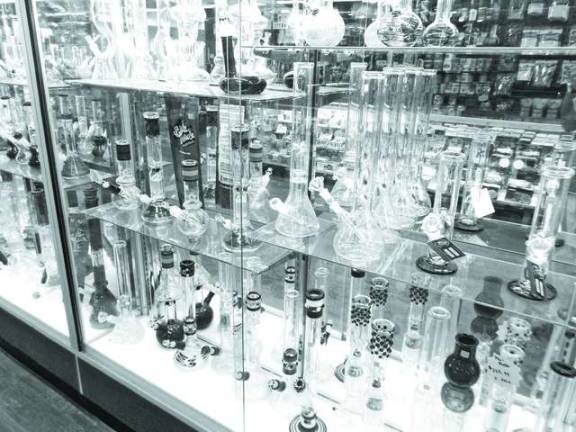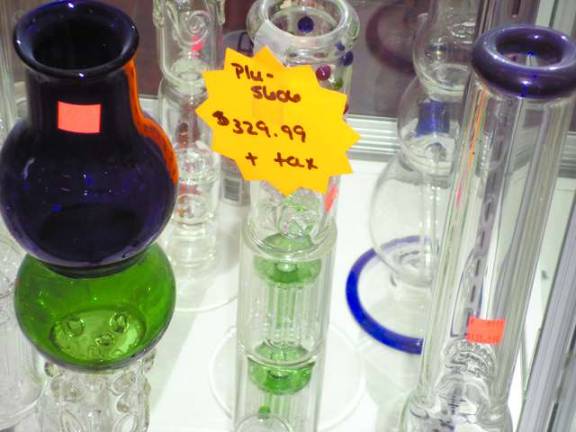Penalty for paraphernalia can be worse than for drugs


By Nathan Mayberg
MATAMORAS — Those plastic ziplock bags at the supermarket might look harmless. But in Pennsylvania, they can lead to serious criminal charges if found alongside a stash of drugs.
In The Keystone State, any wrapper believed to be connected to drug use or storage can lead to misdemeanor drug paraphernalia charges that potentially carry higher sentences than the drugs themselves. The dispositions in Pike County Court that appear regularly in the Courier usually contain such charges.
Defense attorney Matt McClenahen said he'd like to see the drug paraphernalia law go.
"I would just get rid of it outright," he said.
A heroin charge is serious enough, he said. "Do we need to have a separate charge for the mirror — and the rubber band?"
Plus, he said, it's legal to sell the items that people can go to jail for. In fact, Pike County is chock-a-block with smoke shops that sell a wide array of pipes, bongs, hookahs, and rolling papers.
"Everyone knows that nobody is buying water pipes and bowls to smoke tobacco," said McClenahen.
Drug paraphernalia is defined as anything intended to aid in ingesting or injecting drugs into the body. "It's a pretty broad category," he said. "A regular spoon in your kitchen can be used to eat food or heat up heroin."
For example, McClenahen said, if you just bought a pipe but haven't used it yet, but are found in your vehicle with marijuana, you could be charged with possession of drug paraphernalia.
Pipes, flavored cigars, wrapping papers, spoons and rubber bands are all items that can potentially be used for drugs. They are 100 percent legal to possess — unless attached to a drug offense. If the maximum penalty for possessing less than 30 grams, or about an ounce, of marijuana is 30 days in jail and a $500 fine, paraphernalia possession can result in up to one year in jail and a $12,500 fine. Prosecutors and judges have leeway in sentencing.
McClenahen represents a lot of Penn State students. He said first-time offenders are typically given an opportunity to expunge the charge from their record if they complete a diversionary program.
Sheriff: Shops 'not good for youth'
In Matamoras, a one-mile stretch of tobacco road known as Pennsylvania Avenue, features many stores focused on the sale of tobacco. Some also sell pipes and bongs.
At Smoker's Choice, large glass bongs sell for as much as $300, while pipes go for as much as $40. At On the Road Tobacco, small bongs sell for $15 to $40. Smokin' Joe's sells mostly cigarettes but also small pipes and hookahs.
The glass bongs can legally only be used for tobacco. You have to be 18 to enter Smoker's Choice.
"How many people do you see with a five-foot glass bong, with a $200 to $250 (cost), smoking tobacco?" Pike County Sherif Philip Bueki asked. "When you see the ornate pipes with seven or eight lines, that is pushing the envelope."
But, Bueki said, "We still live in America."
He said hookah and cigar use is "way up," and the use of pipes and bongs has "skyrocketed" as the potency of marijuana has increased.
"By barring all of these things, is it really going to end drug use?" Bueki said. "I think not. You can make pipes out of anything."
State Police Corporal Bryon Dickson said drug paraphernalia arrests can include lighters, bags, grinders, glass pipes, wrapping papers, flavored cigars, and hypodermic needles, which are used by diabetics as well as heroin users.
"Typically there's always some type of drug paraphernalia" during a drug arrest, "whether it's packaging, a pipe, a needle, rolling papers," said State Police Sergeant Brian Vennie.
Most paraphernalia charges are misdemeanors. Common paraphernalia arrests are for packaging materials, envelopes and plastic baggies, Vennie said.
"Is it illegal to carry a lighter? No," said Vennie. "If you're using it to light a spoon? Yes."
He said the state police often does field tests on the items based on their training, although some can be sent out for lab testing.
Vennie said there has to be a connection visible to the officer that the item was used for drugs.
"There's gotta be that nexus," he said.
Bueki agrees. "You have to prove that the device was used for an illegal purpose," he said.
His department will typically either do field tests or send the devices out for testing.
"We know what marijuana smells like," said Bueki.
His officers will often find drug paraphernalia when people come into the courthouse and empty their pockets. During traffic stops, deputies sometimes see drugs or drug paraphernalia "in plain view."
"People just have it right there," Bueki said.
Bueki said the prevalence of shops selling paraphernalia in Pike County is "not good for the youth of the area."
Vennie said he couldn't comment on behalf of the state police about whether stores should be able to sell items commonly used for drugs.
Bueki has been a DARE (Drug Abuse Resistance Education) officer for 30 years, teaching fifth graders the dangers of drug use at local schools. He thinks the use of tobacco and alcohol among young people is down but that heroin is epidemic. Heroin used is aided by its cheap availability, he said, while "marijuana is very expensive."
Smoke shops are prevalent in Matamoras and other Pike locations because they're near the New York border and interstate, bringing in high traffic from out-of-state where cigarettes and tobacco can be twice the price.
At Tri-State Tobacco, manager Vindu Singh said 70 percent of his customers are from New York. Customers can buy a box of Montclair cigarettes for $3.94, pure tobacco for $8.79 per pound, or rolling tobacco for $21.99 per pound — about half of what they cost in New York.
But the store doesn't sell the bongs or blunts customarily associated with marijuana use. He said the store's owners "don't want to promote" drug use.
He has seen the large displays of such items at other stores.
"That's too much," he said.